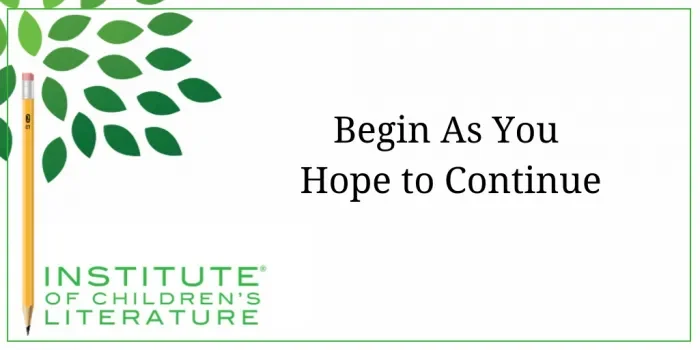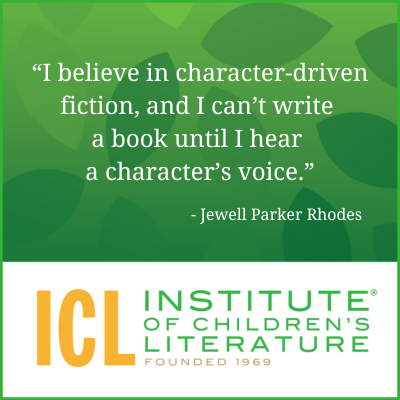1000 N. West Street #1200, Wilmington, DE 19801
© 2024 Direct Learning Systems, Inc. All rights reserved.

Most of us know that how a story or book starts is extremely important. It is with those first words that an agent decides whether to consider representing you, whether an editor decides to read with acquiring in mind, and whether a reader decides if this story is going to be worth their time.

Now, for most of us, the opening we begin with is not the opening we have at the end after revision. Often you’ll find your story starts best in a different spot or at a different time. Often you’ll realize you explain a little too much. This is normal. It’s part of feeling your way around the story when you begin writing it. You don’t need to have the perfect opening to write the story. Revising your opening is nearly always one of the steps in turning your story from a rough draft into a piece that can sell.
So imagine you have a finished story, how do you decide if the opening is strong enough? Here are three things a strong opening will tend to have.
Strong openings are not about telling us things or pondering. Strong openings are about thrusting us into a specific moment of the story and getting the thing moving. So a strong opening will happen in a specific place with a specific character (or characters) engaged in specific, purposeful action. It may be very real to begin as a character wakes up in the morning or as the character eats breakfast, and this kind of opening will meet two of the conditions for “something happening” (namely specific place and specific character). It will even have action. But is it purposeful action? Imagine, right now, removing that first part of the story. Without it, does the story fall apart? Or does the story become stronger and more purposeful?
Now, if you do cut the opening you presently have, that will almost certainly mean that you have to sneak some new bits into the new opening moment (because, chances are your opening was accomplishing something, just not enough). That’s normal. Don’t leave a weak opening just because removing it will require you work on other parts of the story. Revision can be hard work, but it’s essential to publication.
 2. A Surprise
2. A SurpriseA really strong opening almost always contains a surprise. It might be something small, even something as small as having a very young girl who aspires to be a garbage truck driver. It might be something much bigger, like having your main character digging a hole to plant a tree only to discover a hidden cave. It might even be something only slightly off-kilter, such as your main character marching up the stairs of his home naming off all the relatives whose portraits hang on the wall along the stairwell and your realize these people have very, very odd names. If you intend humor to be an important element of your story, it may be something that is both surprising and funny. But including a surprise right at the beginning of a story will almost always hook the reader by making the reader wonder what surprises will come next.
Your writing should sound like your writing and no one else’s. That doesn’t mean you have to struggle and strain to sound “writerly” by pulling out the most obscure words you can find in the thesaurus or by twisting your sentences into new and strange shapes. In writing for young people, “voice” must not compromise clarity. If it does, your opening will fail.

So if you feel the language in your opening is too flat, instead of dragging out your thesaurus, drag out your imagination instead. Dig deeper into making the characters, and the place, and the action real in your head. Run it through your mind’s eye as many times as you can. Imagine standing in the middle of your scene and look around–what objects are there? What is the temperature? Can you smell anything? The more real the scene becomes for you, the more it will unfold in a unique way, and that will pull your voice along with it. Most of the time, lack of voice is just lack of time spent really making the moment feel in your head like a memory, not a mechanical collection of words.
So, take these three keys (voice, action, surprise) and use them to unlock the best possible opening for every story you craft or revise this year. Who knows what amazing things will happen when you do?
With over 100 books in publication, Jan Fields writes both chapter books for children and mystery novels for adults. She’s also known for a variety of experiences teaching writing, from one session SCBWI events to lengthier Highlights Foundation workshops to these blog posts for the Institute of Children’s Literature. As a former ICL instructor, Jan enjoys equipping writers for success in whatever way she can.
1000 N. West Street #1200, Wilmington, DE 19801
© 2024 Direct Learning Systems, Inc. All rights reserved.
1000 N. West Street #1200, Wilmington, DE 19801
© 2024 Direct Learning Systems, Inc. All rights reserved.
1000 N. West Street #1200, Wilmington, DE 19801
© 2024 Direct Learning Systems, Inc. All rights reserved.
1000 N. West Street #1200, Wilmington, DE 19801
© 2025 Direct Learning Systems, Inc. All rights reserved.
1000 N. West Street #1200, Wilmington, DE 19801
©2025 Direct Learning Systems, Inc. All rights reserved. Privacy Policy.
1 Comment